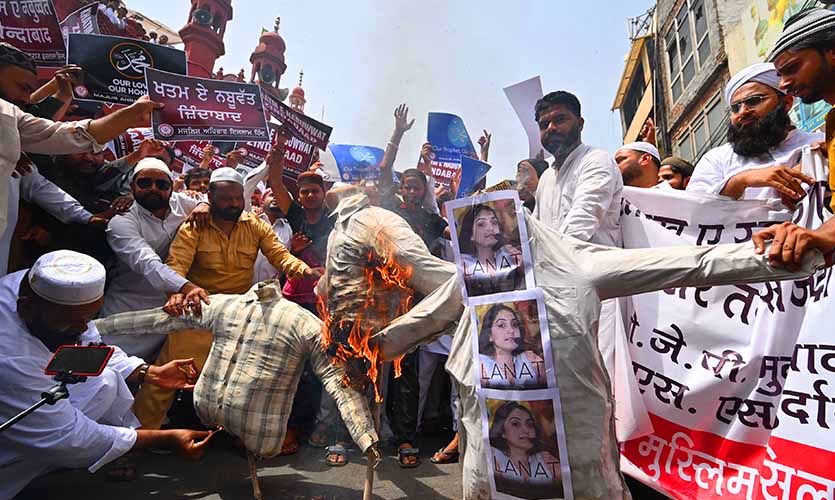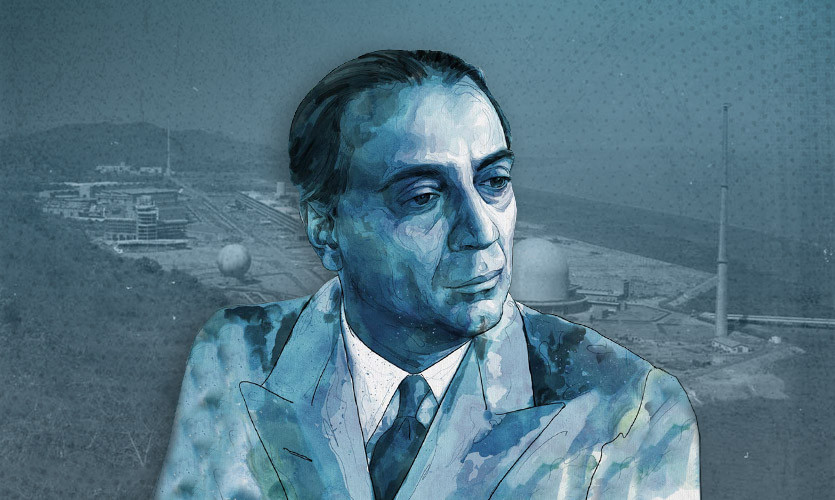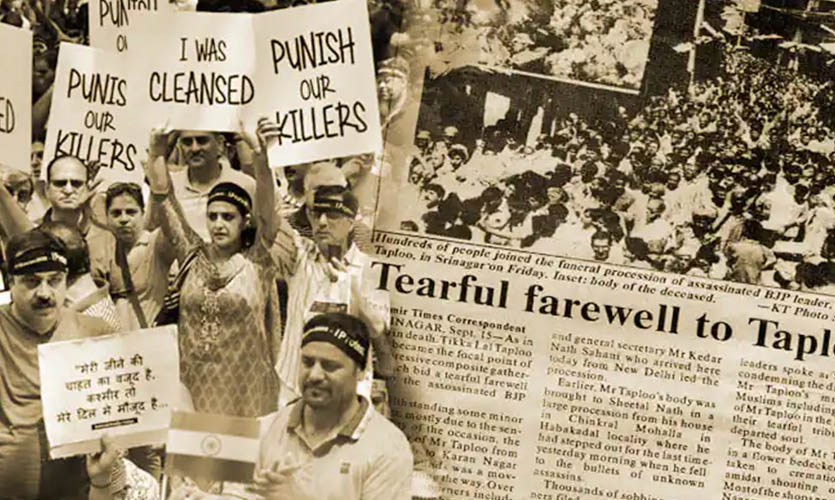The rioting across Indian states sparked following Nupur Sharma’s comments over Prophet Muhammad has taken a dangerous turn, with Islamist terrorist organisations in Asia threatening widespread attacks across the country.
While the Bharatiya Janata Party (BJP) abandoned its spokesperson, classifying her and Naveen Kumar Jindal as “fringe elements”, the opposition and the international community seem to have taken the opportunity to play on the Muslim community’s insecurities.
Has the serving BJP faltered in handling the situation, opening the floodgates to minority victimisation yet again?
The Prophet Row
Nupur Sharma has been the topic of discussion for countless columns, articles, and debates over the past three weeks. The now suspended BJP national spokesperson is facing FIRs in at least three places – Mumbai, Delhi, and Kolkata – along with death threats from several Islamist civilians and organisations. The incident that triggered the violent protests, threats, and international condemnation entailed Sharma bringing up facts about Prophet Muhammad from the Quran during a prime-time debate on Times Now news channel, and the moderator and Times Network group editor Navika Kumar allowing it to pass. The main point of contention is the way in which Sharma chose to present these facts. “They should be told to shut up and stop insulting our religion, otherwise we are very capable of hitting them where it hurts,” said Sharma to the moderator, in response to a fellow panellist – Social Democratic Party of India (SDPI) member Dr Taslim Rehmani – disrespecting the supposed shivlinga at the Kashi Vishwanath temple/Gyanvapi mosque. Unfortunately, there is no record of the televised debate before Sharma’s comments, on any public platform. She continued, “For example, they may want to call it a fawara (fountain) as much as they want… reality is even the Supreme Court ordered protection of the immediate area.” Sharma went on to warn the panellist who was mocking the Hindu god and his idol depiction, saying that she could also make fun and point fingers at his religion by bringing up how the Quran claims that the Earth is flat, or how Prophet Muhammad married a six-year-old and then consummated the marriage when she was nine. While the first claim is not corroborated and did not invite a reaction, it is her second claim about Prophet Muhammad that has incited violent reactions and condemnation. Most protesters have not objected to the authenticity of her words, but have specified that she has “hurt the religious sentiments of Muslims”.
“The Messenger of Allah [ﷺ] married me when I was six years old, and consummated the marriage with me when I was nine, and I used to play with dolls,” narrates Aisha, the wife of Prophet Muhammad, in the Sunan an-Nasa’i (3378) – considered to be the most authentic account of the Hadith. The same has been confirmed by Islamic televangelist Zakir Naik, while quoting the Sahih al-Bukhari (5134). This is in contrast to several statements made by journalists turned influencers such as Alt News co-founder Mohammed Zubair, and Rana Ayyub. Zubair was possibly the first to tweet Nupur Sharma’s video, out of context without the rest of the debate, and state that the moderator Navika Kumar was “encouraging a rabid communal hatemonger & a BJP Spokesperson to speak rubbish which can incite riots”. This was followed by Ayyub’s tweet that read, “The national spokesperson of Narendra Modi’s BJP has used the most derogatory language against Prophet Mohammed, accused him of having sex with a 6 year old on a national news channel.”
About a week after these tweets on May 28, Saturday, India’s streets echoed with demands of beheading Nupur Sharma, soon after the Friday prayers on June 10. The delayed response has also raised questions on the intentions behind these protests. “Gustakh-e-Rasool ki ek hi saza, sar tan se juda, sar tan se juda (There is only one punishment for speaking against the Prophet and that is beheading),” shouted thousands of protesters and demanded several posters, including those belonging to the All India Majlis-E-Ittehadul Muslimeen (AIMIM), a political party led by Asaduddin Owaisi. Although the veracity of the facts uttered by Nupur Sharma has been confirmed, the BJP chose to publicly abandon the spokesperson, bending to international pressure brought on by the Arab world.
How Is The BJP’s Stance Problematic For The Party And India?
In an interview with right wing news portal OpIndia, on May 31, Nupur Sharma expressed gratitude to the senior leadership of the party, including Home Minister Amit Shah’s office, for assuring police protection. However, five days later, on June 5, the national spokesperson was suspended and branded as one of the “fringe elements”, following which she issued a public apology and unconditionally withdrew the statement during the debate. While distancing itself from Nupur Sharma and Delhi BJP media head Naveen Jindal may have been essential for the party, terming them as problematic outsiders and their suspension seemingly proved encouraging for critics. The party, which has consistently taken a pro-hindu stand and championed “national interest”, also disappointed its loyal supporters and vote bank with this decision. Moreover, the Government of India effectively spoke for the party. As Times Now editor-in-chief Rahul Shivshankar points out in his “calm-headed analysis”, by “acting as BJP’s external publicity wing, MEA [Ministry of External Affairs] made India as a whole liable for illiberal comments of party apparatchiks”.
The decision to bend and crawl came after mounting pressure from the Gulf, a charge led by Qatar. “Demands from Gulf countries seeking an apology from the government were not important,” said Kerala governor Arif Mohammad Khan. Responding to Qatar’s foreign affairs ministry, the Indian Embassy in Doha issued a statement that read, “In line with our civilisational heritage and strong cultural traditions of unity in diversity, Government of India accords the highest respect to all religions.” Similar events transpired in Iran, Kuwait and others, all of which demanded public apologies from the Government of India. The Organisation of Islamic Cooperation (OIC) also condemned the remarks made by BJP members, saying that they came in the “context of intensifying hatred and abuse towards Islam in India and systematic practices against Muslims”. “Ajit Doval reaffirmed the Indian government and officials’ respect for the Prophet Muhammad (PBUH), saying offenders will be dealt with, at the government and related bodies levels, in such a way that others will learn a lesson,” said the Iranian delegation in a press conference during a visit to India. However, MEA spokesperson Arindam Bagchi has denied the account. “My understanding is that this issue was not raised during that conversation… We have made it pretty clear that tweets and comments do not reflect views of (the) government. This has been conveyed to our interlocutors as also the fact that action has been taken by the concerned quarters against those who made the comments and tweets,” he said.
The external affairs ministry’s clarifications came in response to the demands of such countries that cannot claim supporting equality of religions, let alone live upto the standard. Out of about 50 Muslim majority countries in the world, at least 26 have Islam or a specific form of it, as the state religion. In most Islamic countries, apostasy (here: the renunciation of religious beliefs) is punishable by death. The UAE does not permit conversions, Qatar does not allow public display of faiths except Islam, and Iran is considered untrustworthy even by its Muslim neighbours. Kuwait took the first chance to deport dissenters who were protesting against Nupur Sharma’s comments without permission. This is amid calls for her beheading, burning of her effigies, and bounties on her head. Additionally, her fellow panellist that fateful debate evening, in whose response she made the comments, has not been reprimanded for insulting the religious symbols revered by the Hindy community. It can be argued that India needs the Gulf. “Oil matters,” as Ayyub tweeted. But the Gulf needs India as well.
“We shall kill those who affront our Prophet and we shall bind explosives with our bodies and the bodies of our children to blow away the ranks of those who dare to dishonour our Prophet,” declared the Al Qaeda in the Indian Subcontinent (AQIS), threatening suicide bomb attacks across Delhi, Gujarat, Mumbai, and Uttar Pradesh to exact revenge from “saffron terrorists”. On June 19, the Islamic State-Khorasan Province claimed responsibility for the terrorist attack at the Karte Parwan Gurdwara in Kabul’s Bagh-e-Bala area on Saturday. The group stated that it had targeted Hindus, Sikhs, and the “apostates” who protected them, in “an act of support for the Messenger of Allah”, and as revenge against the “insult” of Prophet Muhammad by BJP members. On Sunday, the Indian government granted visas to 111 Afghan Sikhs who wanted to come to India. Interestingly, these developments are in contrast to the Arab world, most of which neither questions the treatment of Uyghur Muslims in China, nor offers refuge to the Rohingya Muslims of Burma.
Rebellion Without A Cause?
India has been on the radar of the international community given the increased incidents of violence this month, after a break from the communal violence related to the hijab controversy. When asked by a Pakistani journalist at the White House about what he would like to say on the rise in “hate crimes committed by (the) Indian government against Muslims and minorities”, US State Department spokesperson Ned Price said that they were “glad” that the BJP publicly condemned the party officials. “We encourage India to promote respect for human rights,” he added. Noteworthy, minorities in Pakistan, comprising the Hindus (1.6 percent), Christians (1.59 percent), Scheduled Castes (0.25 percent), Ahmadis (0.22 percent), and others (0.07 percent) form less than 4 percent of the population as per the 2017 census, compared to 23 percent during independence. The Muslim population in India forms 14.2 percent of the population as per the 2011 census, up from 9.8 percent in 1951, and the current growth rate of the community is 24.6 percent.
The violence ensuing across at least 10 states in India is not communal, as there is only one community reported to be involved in the stone-pelting, burning of state property, and harming police personnel. Considering the charges that the BJP government is responsible for these riots, one should also take into account that the state of Jharkhand was the worst affected, with two civilian casualties among the stone-pelting crowd in Ranchi. The Jharkhand administration comprises the Jharkhand Mukti Morcha and the Congress. While the Uttar Pradesh government has been accused of targeting protesters in Kanpur by bulldozing their homes, the apex court has refused a stay order on the action, although seeking an explanation as the action cannot be “retaliatory”. However, UP CM Yogi Adityanath’s media adviser Mrityunjay Kumar did comment: “Every Friday is followed by Saturday” (the houses were bulldozed on Saturday, June 11, after violent stone-pelting incidents on the preceding Friday). Haryana BJP IT chief Arun Yadav also tweeted, “Now Friday being Stone-Day… Saturday should be declared as “Bulldozer Day”.”
As far as the “right to dissent”, as pointed out by the opposition is concerned, it should be noted that most of these protests did not have prior permission as required by law, not unlike the Congress leaders protesting Rahul Gandhi’s questioning in the National Herald case by the Enforcement Directorate. The detained leaders failed to mention the lack of police permission, not given to them citing the “communal situation” across the country, ignoring which they chose to protest anyway. The rioting across states has evolved from against Nupur Sharma, to in support of Rahul Gandhi, and further, against the Agnipath scheme. Over the past few days, individuals, especially in non BJP states, have been protesting against the scheme, of which one of the points of contention is the upper age limit. Persons nowhere close to the current limit of 23 years are voicing their displeasure by destroying state property and setting school buses and trains on fire, while demanding to be inducted into training to protect the country. Fortunately, at least one highest office of India is more firm than the rest. “No rollback of the Agnipath scheme. There will be positive changes and the scheme will be tweaked as required when it is rolled out,” said Chief of Army Staff General Manoj Pande.
There may be more problematic faces and phases to this government, but it has certainly not been laboured with minority appeasement before. While maintaining peace without retaliatory action is important, and the required job description, not letting injustice persist and the core culprits providing the stones and the kerosene pass, is also a duty. As reiterated in several pieces of this column before, India would do well to be ready to face any and all aggression within and outside the country, without the help of its so-called allies, and possibly against them, truly living up to the atmanirbharta that this government claims to champion, and Bharat definitely has.
The Horus Eye is a weekly column written by Divya Bhan analysing current affairs and policies. This column does not intend or aim to promote any ideology and does not reflect the official position of The Sparrow.
Also read: The Rising Wave Of Communal Riots In India Does Not Seem To Have A Trough
Also read: How Is The ‘Neighbourhood First’ Policy In India’s Interest?










